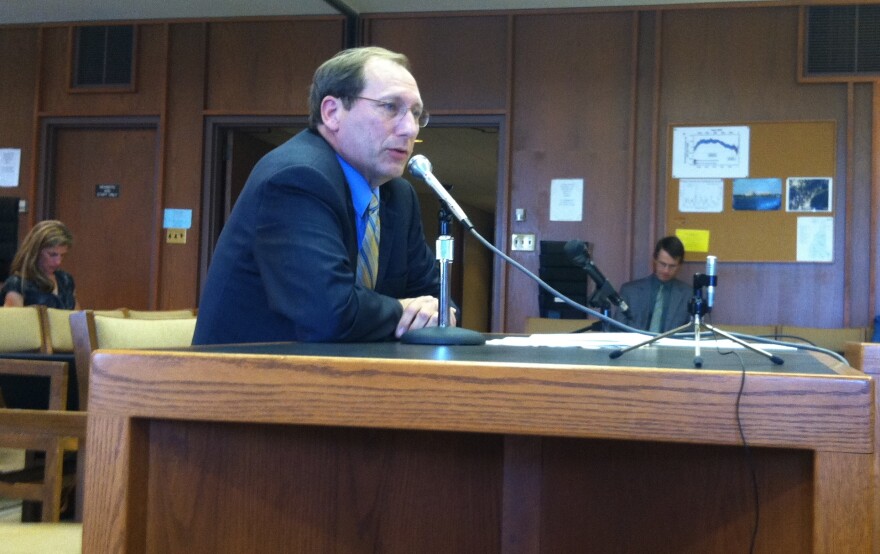There’s a growing sense among some New Hampshire legislators that Public Service of New Hampshire is headed towards a crisis. But on Wednesday PSNH insisted to lawmakers at subcommittee hearing that it is the best positioned power company in New England to weather an uncertain energy future.
This long-simmering issue finally seem to be coming to a head. More than 50 percent of PSNH’s customers have left them for cheaper suppliers. 20,000 residential customers have left in the last few months. That means fewer and fewer PSNH customers are paying for the costs for the company to own and run its own power plants, which increasingly spend much of the year idle. Notably, they are shelling out for a $422 million dollar scrubber that is cleaning up emissions from coal-fired Merrimack station in Bow.
That could make for a nightmare scenario.
“If you’re a PSNH customer it’s a bit like playing musical chairs.” Dan Allegretti – who represents PSNH competitors for the Retail Energy Supply Association – told lawmakers, “You know you don’t want to be standing when the music stops, because if you’re the very, very last customer on PSNH default service, you’re going to be getting a bill for four hundred and some odd million dollars.”
This is known as a death spiral, and it’s the extreme that lawmakers are hoping to avoid. They heard from a chorus of voices –competitors, environmental groups, the state’s consumer advocate – all singing in unison: something has to be done.
The question is what.
PSNH: Charge Competitors More
Gary Long Former PSNH President, and now Executive for New Hampshire Energy Policy, has a couple of suggestions, all of which would shift more costs to their competitors.
For instance, as the state’s one regulated utility PSNH does the billing for its competitors. Long said they could charge a penny per kilowatt hour for that service.
“Go for billing for instance, there’s nothing in the law that says we have to do that,” cried Long, clearly frustrated with the situation, “It’s outdated. Change it! Change it, and the problem starts to go away!”
Another Long suggestion: require customers who have switched to competitors to pay for the scrubber, which would again, add about a penny per kilowatt hour.
But that solution – and others that would raise electric rates for end users to the point where they would be close to those of PSNH – are unlikely to get much traction.
“To say to people that have made competitive choices, now suddenly we’re taking away that competition by shifting the public policy underneath them… I just don’t think that’s equitable,” said Senator Jeb Bradley, a veteran of energy policy and frequent PSNH ally.
There were several moments of heated back and forth between Long and Bradley. Long laid the fault of high rates at the feet of the legislature for mandating the installation of the scrubber at the Bow power plant, and Bradley rejoined that PSNH not only pushed for the scrubber, but continued to charge forward after cost overruns that nearly doubled the price tag.
Competitive Suppliers: PSNH Shareholders Should Pay
There are other possible solutions.
Competitors want PSNH to sell its power plants, probably at a loss, and make Northeast Utilities shareholders eat some of those losses. The rest would be recovered by all ratepayers.
In a report issued early in the summer PUC staff estimated such a sale would cost PSNH somewhere between $200 and $600 million.
“What drives that is really Merrimack station, it’s the investment in the scrubber,” former PUC chairman Doug Patch – who now represents PSNH competitor Transcanada – told lawmakers, “Which some would argue, including Transcanada, was imprudent to have done given the conditions in the market.”
Conditions like the drop in gas prices, which have made Merrimack station run ever less and make it hard PSNH to recoup their investment.
Whether building the scrubber was prudent, and therefore whether PSNH can get paid for all or part of it, is a question that regulators will be deciding in the coming months. Obviously PSNH isn’t interested in losing profits for its shareholders, and will fight to recover that investment.
Priority Going Forward
So for now, the battle lines are drawn.
PSNH is bleeding customers and say that competitors should pay more to support the functions of a regulated utility. Competitors hear what PSNH is saying, and they want it out of the market, and to bear the costs of getting out.
There are plenty of possible scenarios in between: for example, lawmakers could do nothing.
If PSNH really is in a death spiral, regulators could require them to offer lower rates anyway, again at the expense of corporate profits. Or regulators can tell PSNH to retire many of its plants. Both solutions require no action from the legislature, but it’s unclear if regulators are willing to take this step.
It’s a complicated problem, with no simple answers
“So what are we doing? Where are we headed? And I want the whole picture looked at not just a piece of it,” Committee member Jackie Cali-Pitts asked, “And I don’t think I will [get that] because the window for legislation is closing.”
Whatever proposal gets hashed out between now and January, it’s clear that the question of what to do about PSNH will be a priority for lawmakers next session.



